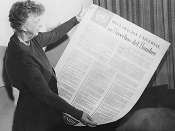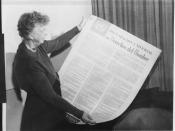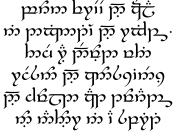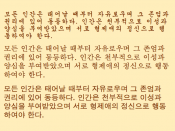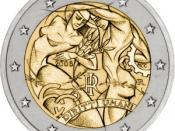Human rights are the basic rights and freedoms to which all humans, teenagers included, are entitled. The Universal Declaration of Human Rights recognises the ÃÂequal and inalienable rights of all members of the human familyÃÂ1. In the on-going tug-of-war between adults and adolescents, there exist two opposing attitudes which can be summed up by the typical teenage ÃÂButt out of our livesÃÂ and the opposing, paternal view of ÃÂWeÃÂre limiting your rights for your own good.ÃÂ It is true that Australian teenagers have rights. These rights should not be trampled. And there are some extremely important rights of which Australian teens have been robbed.
Contrary to popular opinion, the rights which we, the teenagers of Australia, are most lacking are not associated with our freedom to drink alcohol. They are not related to internet censorship. They circumvent curfews and P Plate restrictions. They are more important than video game censorship and Alcopop taxes.
These essential rights are the Right to Protection, the Right to Education and the Right to Good Role Models in society. Unfortunately, we teenagers often seek to relinquish our Right to be Protected because the government uses that same motive to justify limiting other freedoms of ours. In contrast, our Rights to Education and Good Role Models have been neglected by our somewhat hypocritical culture, which teaches us that binge drinking is acceptable, that following the crowd is paramount, and that we should aspire to such dubious role models as Corey Worthington. Often the very problems which our government tries to fix through freedom-restricting laws are caused by these failures of our society to educate teenage minds beyond the superficialities of peer pressure and alcohol abuse. Authoritarian measures such as Alcopop taxes and alcohol restrictions are bandaids which the government uses to patch up deeper social wounds.
The truth is that the laws our government often force upon us, while seemingly harsh and in breach of our rights, actually fulfil our Right to Protection. For example, curfews imposed by the Western Australian government upon young teenagers surely contravene Article 20 of The Universal Declaration of Human Rights, which states that ÃÂEveryone has the right to freedom of peaceful assembly and association.ÃÂ2 However, there is never smoke without a fire. The reason such Draconian laws are introduced is because the young people of Australia have pushed the government to these drastic responses. We protest at government interference in our lives, but our stupid mistakes often interfere with the lives of others. For example, in 2008, a drunk and unlicensed 16-year-old ran over a young mother and her two children in a NSW carpark, causing extensive injuries to the children.3 If there were no restrictions on underage drinking or drunk driving, sad incidences such as these would surely increase. The general public often need protection from the minority of foolish teenagers who let the rest of us down. Sometimes the government has no choice but to override some of our rights in order to protect us from the mistakes which we hot-blooded, not-quite-mature teenagers are prone to make. If our government is made to believe that irresponsible party-animals such as Corey Worthington typify the average Aussie teenager, then it is little wonder that the government responds with seemingly callous P Plate laws, taxes on alcohol and curfews.
AustraliaÃÂs teens are not morons. However, many Role Models produced by our society appear to behave like morons. It doesnÃÂt take a genius to realise that the behaviour exhibited by Parliamentarians during Question Time is as questionably mature as the behaviour of your local skinny-legged skateboarder or Holden-driving hoon. This illustration of bickering politicians is a hint to the underlying social contradiction between what adults say and what adults do. For example, we often learn not from the words that fall from the lips of our parents or politicians, but from the liquor that all-too-often pours down their throats. A previous Speaker of the NSW Parliament is quoted as saying, ÃÂParliament is one of the few places where alcohol is freely available in the workplace at all hours... Suffice to say drinking remains a problem.ÃÂ4How can teenagers be expected to drink responsibly or make wise decisions when the very messages they hear and see in Parliament and at home fly in the face of the rhetoric fed to them? In our country, national holidays equate to an excuse to booze, and weekends are consumed with drinking at pubs and parties. This hypocrisy and double-standard amongst adults leads to irresponsible teenage behaviours, such as underage and binge drinking, which our government then attempts to combat with harsh laws such as the Alcopop Tax. Governments and parents must take responsibility for the destructive aspects of Australian culture which breed negative teen behaviours. Rather than simply limiting teenage freedoms, our culture must be reformed from the ground-up, so that subsequent generations of Aussie teens will not have to suffer such restrictions of freedom.
In answer to our calls to ÃÂbutt outÃÂ ÃÂ No, our government cannot and will not lessen the laws inhibiting teen rights, at least not at the present time. This is due to the misconception that the majority of AustraliaÃÂs youth are prone to drink driving, drug overdose, suicide or misconduct if left to their own devices. Before the government can ÃÂbutt outÃÂ, we must first prove to our politicians, to our parents, and to our society that only a small percentage of AustraliaÃÂs youth are morons. The fact is that most Australian teenagers are responsible, sensible and capable of making good decisions most of the time. Those teens who have their heads screwed on straight owe their maturity to good education, good role models and the type of government protection that works. If we want more freedoms, if we want our rights, if we want the government to back off, then we must prove ourselves as responsible and trustworthy. The only reason that harsh laws such as curfews and P Plate restrictions exist is to protect ourselves and others from the destructive behaviours that are portrayed as common to many Australian teenagers. If parents, the government and the teenagers of Australia can be better educated to take more responsibility, and experience enriched and healthier lives, then there will not be a need for as many restrictive laws and infringements of teenage rights.
REFERENCES:1 Preamble, Universal Declaration of Human Rights. www.un.org2 Article 20.1, Universal Declaration of Human Rights. www.un.org3 Author unknown, 2008, ÃÂÃÂDrunkÃÂ teen driver runs down family: policeÃÂ, ABC News 4 Kevin Rozzoli, (2006). Gavel to Gavel: An insiderÃÂs view of parliament, p. 92
